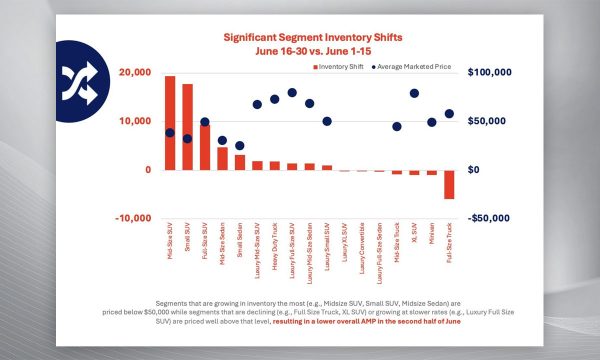There was a general sense of relief from the Canadian automotive industry when the federal government announced on Friday it would pause its electric vehicle mandate for 2026 and is launching a 60-day review.
The mandate would have required all manufacturers to sell at least 20 per cent zero emission vehicles (ZEVs) from overall sales by the start of 2026 or face financial penalties. The automotive community had been lobbying against this for some time, feeling the goal was too ambitious and unattainable. The matter became even more pronounced with the ongoing tariffs U.S.
“We have an auto sector which, because of the massive change in U.S. policy, is under extreme pressure,” Canadian Prime Minister Mark Carney said on Friday at a news conference in Mississauga, Ontario. “We recognize that they’ve got enough on their plate right now, so we’re taking that off.”
The ZEV targets had been put in place by former Canadian Prime Minister Justin Trudeau.
“This is a positive step as it gives certainty to consumers and the industry for the next year and will help to avoid a consumer availability and affordability crisis in the short term,” said the Canadian Automobile Dealers Association in a media release following the news. “The provinces of Quebec and B.C. should now follow this lead to avoid perpetuating internal trade barriers.
“CADA will be engaging actively with the federal government during the review period to ensure that any adjusted plan considers the vast differences in consumer demand across the country, as well as what is reasonable and possible with the current and planned charging and energy infrastructure.”
The Global Automakers of Canada echoed CADA’s comments, saying they were pleased that the federal government recognized that consumer adoption of EVs “is not where either government nor the industry had anticipated it would be a few short years ago,” according to David Adams, the association’s president.
“Our members are fully committed to the transition of their product portfolios to electrified transportation. This is the future of our sector, however that transition can only happen as quickly as consumers are willing to move and it is clear that higher initial upfront cost and the lack of widely available quick, reliable charging infrastructure have hindered uptake.”
He said if any mandate is instituted going forward it reflects current market realities and not the vagaries of government policy.
“While we await more details on this announcement, we also call on the governments of Quebec and British Columbia to pause their programs — which contain even more aggressive targets over shorter time horizons — and work with the federal government to the ensure that if Canada is to have a ZEV mandate that we have just one national mandate, which is consistent with the pervasive view in Canada that we have too much duplicative regulation hindering our economy.”
Brian Kingston, President and CEO of the Canadian Vehicle Manufacturers’ Association, said the federal announcement is an important first step to reduce costs for the automotive industry.
“The EV mandate imposes unsustainable costs on auto manufacturers, putting at risk Canadian jobs and investment in this critical sector of the economy,” said Kingston. “A full repeal of the regulation is the most effective way to provide immediate relief to the industry and keep it competitive. We look forward to working with the federal government as it takes a review of the regulation.”
The New Car Dealers Association of B.C. (NCDA) also applauded the news, calling it a “responsible and realistic” move given current market conditions. Moreover, it said the NCDA is now urging the B.C. government to adopt the same approach.
“For many months we’ve cautioned that our two senior levels of government are setting ambitious sales quotas that simply don’t match today’s consumer demand,” said Blair Qualey, President of the NCDA. “Ottawa has made the right decision to take a step back. Now it’s time for B.C. to follow suit.”
Ian P. Sam Yue Chi, President of the Corporation concessionnaires automobiles du Québec (CCAQ), said his association welcomes Carney’s announcement, particularly with regard to the exemption granted for the 2026 model year.
“It was high time that the Government of Canada followed the lead of the Government of Quebec, which has already taken several concrete steps following the CCAQ’s representations,” said Sam Yue Chi.
He noted the announcement of a full credit for plug-in hybrid vehicles, a half-credit for non-rechargeable hybrids, public consultations this summer, and the commitment to table a draft regulation as early as this fall to adjust the mandate targets.
“We nevertheless hope that Quebec will also grant, in the short term, the same exemption for the 2026 model year, in order to provide the industry with the predictability it needs,” said Sam Yue Chi.
Daniel Ross of Canadian Black Book told Canadian auto dealer that while EV sales represented about 18 per cent of all new vehicles sold in the last quarter of 2024, it was actually a false number predicated by consumers rushing to buy the cars in Quebec due to news that federal and provincial rebates were going to be reduced.
In January, the federal government put a pause on its rebates of $5,000 for ZEVs when the program ran out of money. In Quebec, there was a rush to buy EVs when the government announced in December it would be pausing its rebate program in February 2025, when the funding is fully depleted. The program was revived by the province in April as part of its new budget. The program is scheduled to end by 2027.
He predicted ZEVs would account for 15 per cent of all new car sales by the end of 2025. He said by the end of 2026 it would have increased to 17 per cent.
“That’s likely to change obviously because there’s not as big a push,” said Ross. “I don’t think manufacturers will be incentivizing EVs and plug-ins as readily as they have been. It was all in an effort to get to 20 per cent. They are coming out with some product now that will support that, but without the 20 per cent and the risk of that penalty impeding their financials, it’s not as big an issue.”


















